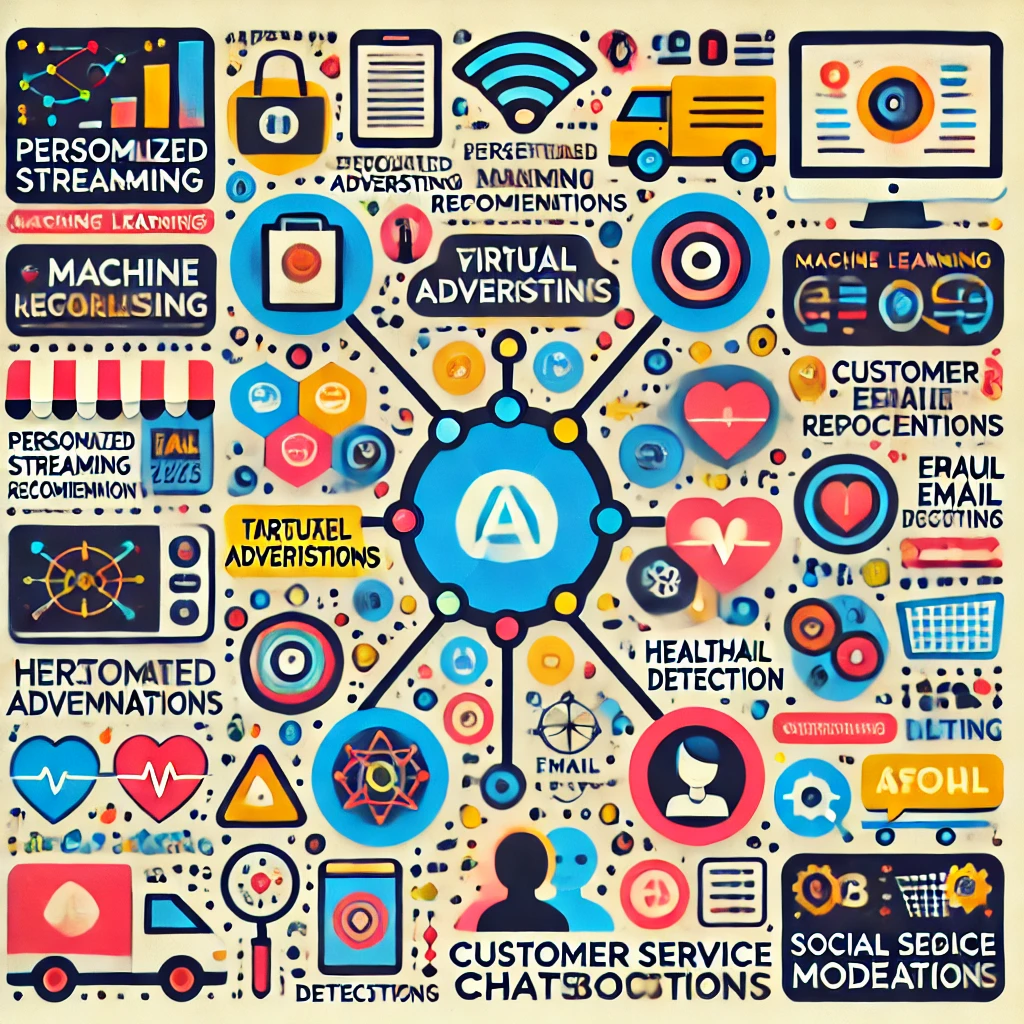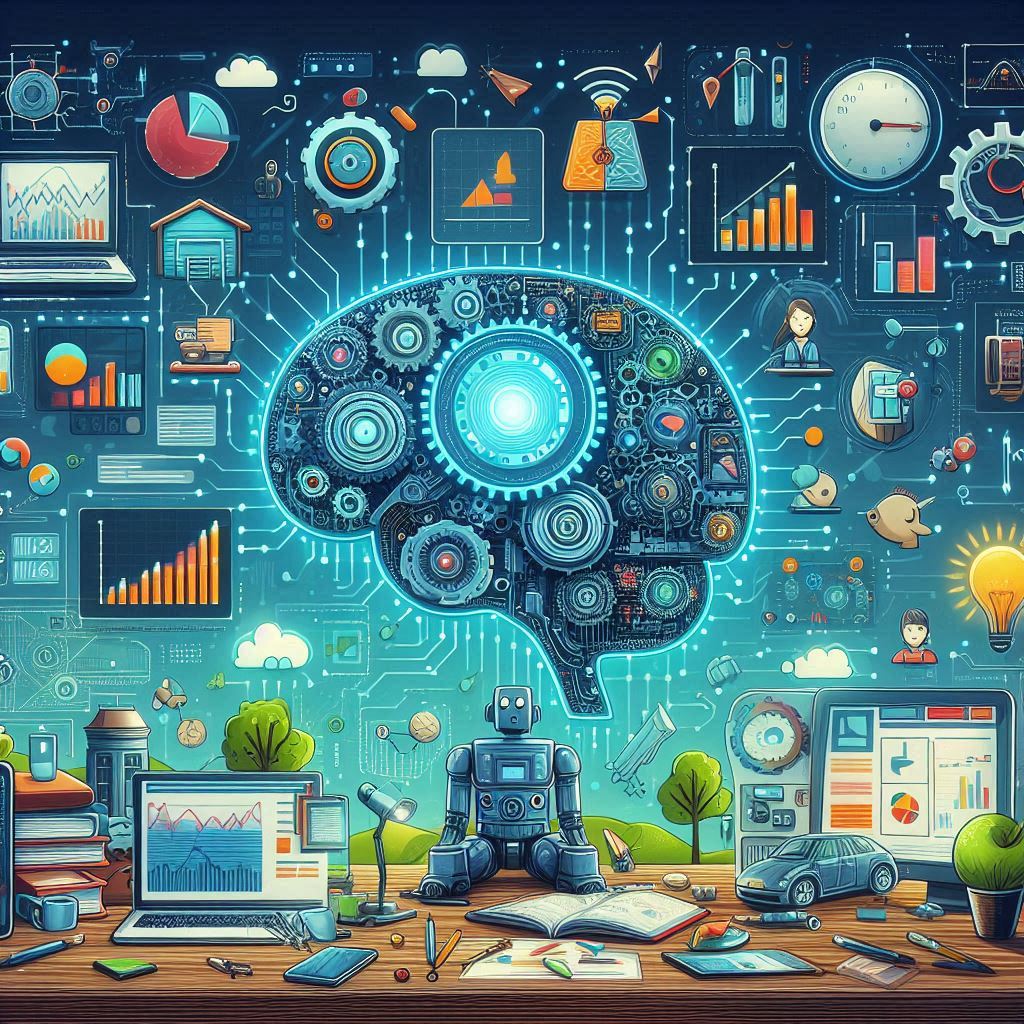Machine Learning (ML) is a groundbreaking technology that has seamlessly integrated into our daily lives, often operating in the background to enhance convenience, efficiency, and decision-making. As a subset of artificial intelligence (AI), ML enables systems to learn from data, identify patterns, and improve their functionality over time. From personalized streaming recommendations to advanced healthcare diagnostics, machine learning influences the way we live and work, often without us even noticing.
This article explores the diverse applications of ML, highlighting how it transforms everyday tasks and what its future holds for society. By understanding these applications, we can better appreciate the technology that silently powers much of our modern world.
What Is Machine Learning?
Machine learning is a field of AI that focuses on creating systems capable of learning and adapting from data without being explicitly programmed. Instead of following predefined instructions, ML algorithms analyze data, recognize patterns, and make decisions based on their findings. This ability to “learn” and adapt makes ML an ideal tool for solving complex problems and improving efficiency in various domains.
There are three primary types of machine learning:
- Supervised Learning: The system is trained using labeled data, where the input and output are explicitly defined. It’s commonly used for tasks like classification and regression.
- Unsupervised Learning: The system analyzes unlabeled data to identify hidden patterns or groupings, such as clustering similar items.
- Reinforcement Learning: The system learns by interacting with an environment, receiving rewards or penalties based on its actions, often used in robotics and game development.
This versatility allows ML to be applied across industries, reshaping how tasks are performed and decisions are made.
Everyday Applications of Machine Learning
Personalized Recommendations
Streaming platforms like Netflix, Spotify, and YouTube use ML to analyze user behavior, such as viewing history and preferences, to recommend content tailored to individual tastes. These algorithms keep users engaged by continuously refining suggestions based on their interactions. For example, when Netflix suggests a show that aligns with your viewing habits, that’s ML at work.
Targeted Advertising
Machine learning has revolutionized digital advertising. By analyzing user behavior, search history, and social media activity, ML algorithms deliver highly targeted ads. For instance, if you search for running shoes online, you might soon see ads for athletic apparel on various platforms. This personalized approach increases the relevance of ads, benefiting both businesses and consumers.
Virtual Assistants and Smart Devices
Virtual assistants like Siri, Alexa, and Google Assistant rely on ML and natural language processing (NLP) to understand user commands, provide information, and complete tasks. These assistants improve over time by learning from user interactions, making them more efficient. Similarly, smart home devices use ML to optimize routines, such as adjusting thermostat settings based on your preferences.
Email Filtering and Spam Detection
Email services like Gmail use ML algorithms to filter spam, detect phishing attempts, and categorize messages. By analyzing patterns and user feedback, these systems identify and block malicious emails while ensuring important messages reach your inbox. This dynamic filtering system continuously evolves, adapting to new threats and user behaviors.
Fraud Detection
Financial institutions use ML to enhance security and detect fraudulent activities. By analyzing transaction data, ML algorithms identify anomalies that may indicate fraud, such as unusual spending patterns or foreign transactions. These systems help banks prevent fraud in real-time, safeguarding both consumers and businesses.
Healthcare Innovations
In healthcare, ML powers diagnostic tools, predictive analytics, and personalized treatment plans. For example, ML algorithms can analyze medical images to detect diseases like cancer at an early stage, improving patient outcomes. Wearable devices like fitness trackers use ML to monitor vital signs and provide health recommendations, encouraging healthier lifestyles.
Customer Service Automation
Many businesses now deploy ML-powered chatbots to handle customer inquiries. These chatbots provide instant responses, resolve common issues, and guide users through troubleshooting steps. By learning from past interactions, chatbots improve their accuracy and relevance over time, enhancing customer satisfaction while reducing operational costs.
Social Media Content Moderation
Social media platforms utilize ML to detect and remove harmful content, such as hate speech, misinformation, and explicit material. These systems analyze text, images, and videos to enforce community guidelines. While not perfect, ML-based moderation improves efficiency and helps maintain safer online environments.
The Benefits of Machine Learning in Daily Life
Enhanced Efficiency
By automating repetitive tasks, ML allows us to focus on more complex and creative activities. For instance, virtual assistants can handle scheduling and reminders, freeing up time for more important work.
Personalization
ML enhances user experiences by delivering personalized content, whether it’s a tailored playlist on Spotify or a curated shopping list on Amazon. This customization keeps users engaged and satisfied.
Improved Security
From fraud detection to spam filtering, ML enhances cybersecurity by identifying threats and mitigating risks in real-time. Its ability to adapt to new patterns makes it an invaluable tool in safeguarding digital environments.
Accessibility
ML-powered tools like voice-to-text applications and screen readers make technology more accessible to individuals with disabilities, promoting inclusivity and equal access to digital resources.
Challenges and Ethical Considerations
While ML offers numerous benefits, it also presents challenges and ethical concerns. These include:
Data Privacy
The vast amount of data required for ML raises concerns about privacy and security. Ensuring data is collected, stored, and used responsibly is critical to maintaining user trust.
Bias in Algorithms
ML algorithms can unintentionally perpetuate biases present in their training data, leading to unfair outcomes. Developers must prioritize fairness and transparency to mitigate this risk.
Dependency on Technology
As ML becomes more integrated into daily life, there’s a risk of over-reliance on automated systems, potentially reducing critical thinking and problem-solving skills.
The Future of Machine Learning in Everyday Life
As ML technology continues to advance, its applications will become even more diverse and impactful. Some emerging trends include:
- Autonomous Vehicles: ML is a key component in developing self-driving cars, enabling them to analyze traffic patterns, detect obstacles, and navigate safely.
- Smart Cities: ML will optimize urban planning, energy consumption, and transportation systems, improving the quality of life for city dwellers.
- Advanced Healthcare Solutions: Future ML innovations could include predictive analytics for disease outbreaks and AI-powered surgical robots.
These developments promise to make ML an even more integral part of our lives, enhancing convenience, efficiency, and innovation.
The Ubiquity of Machine Learning in Everyday Life
Machine learning seamlessly integrates into our daily routines, powering the tools and services we often take for granted. From personalized streaming suggestions to safeguarding online transactions, this technology shapes our interactions with the digital world in numerous ways. The visual below highlights key applications of machine learning that impact our lives, often without us realizing their full scope.

Conclusion
Machine learning has quietly become a cornerstone of modern life, powering technologies that simplify tasks, enhance user experiences, and improve decision-making. From personalized recommendations and virtual assistants to healthcare innovations and fraud detection, ML’s applications are vast and far-reaching. As this technology evolves, its impact on daily life will continue to grow, shaping the way we live, work, and interact with the digital world.
Understanding and embracing machine learning not only helps us appreciate its current benefits but also prepares us for a future where this technology plays an even more central role in our lives.
Thank you for reading!
Enjoyed this article? We’ve got more content on this topic just for you. Check out our latest post in the same category and continue expanding your knowledge.
Read the next article and stay informed!






